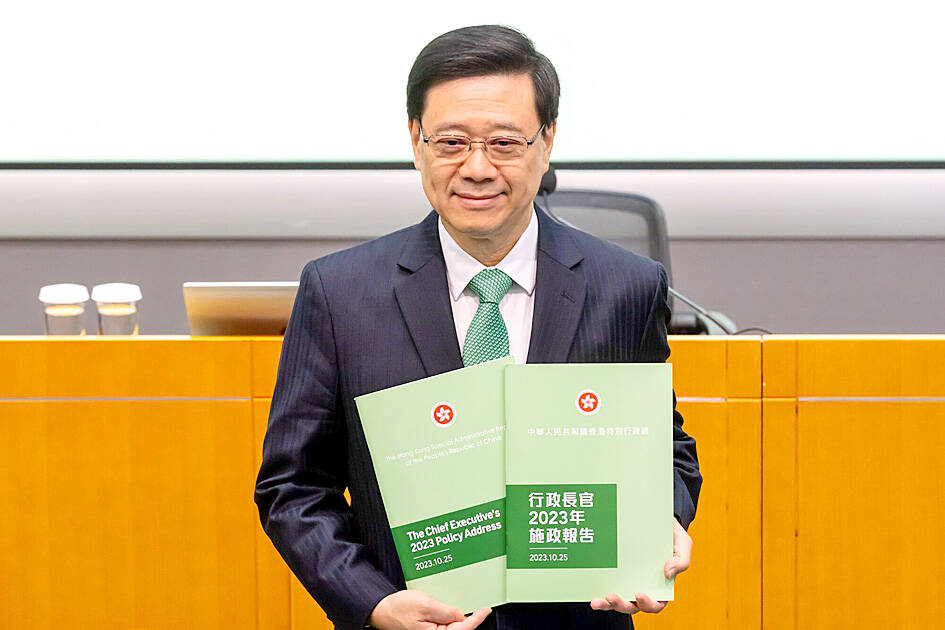Hong Kong Chief Executive John Lee (李家超) yesterday said that the territory would create its own national security law next year, four years after Beijing imposed sweeping legislation aimed at silencing dissent.
The Beijing-anointed leader unveiled measures in a policy address aimed at revitalizing Hong Kong’s economy and flagging population growth, while asserting the need to protect the territory from “external forces.”
“Some countries are undermining China and the implementation of ‘one country, two systems’ in Hong Kong for their own benefits,” Lee said, referring to the governance model agreed by Britain and China under which the territory would keep some autonomy and freedoms following the 1997 handover.

Photo: Bloomberg
“External forces continue to meddle in Hong Kong affairs,” he said.
“We must guard against those seeking to provoke conflict ... and remain alert to acts of ‘soft resistance’ in different forms,” said Lee, using a phrase that Chinese and Hong Kong officials have used in speeches to denote anti-government actions.
Protests rocked the territory in 2019, bringing hundreds of thousands of people to the streets to call for greater freedoms and more autonomy from mainland China.
In response, Beijing imposed a National Security Law to punish four major crimes — secession, subversion, terrorism and collusion with foreign forces — with sentences of up to life in prison.
Lee — who is under US sanctions for his role in stamping out the protests — said that Hong Kong would “continue to safeguard national security.”
“The government is pressing ahead to draw up effective legislative options and will complete the legislative exercise in 2024 to fulfill our constitutional duty,” Lee said.
Under the Basic Law — the territory’s mini-constitution — Hong Kong is required to implement its own law combating seven security-related crimes, including treason and espionage.
The task, often referred to as “a constitutional responsibility” by the Hong Kong government, has yet to be fulfilled more than 25 years after its return to Chinese rule.
The last legislative attempt in 2003 was shelved after about 500,000 people took to the streets in protest.
Data from the Hong Kong Security Bureau showed that as of the end of last month, 280 people had been arrested and 30 had been convicted under the National Security Law.
The legislation has effectively snuffed out political dissent.

PREPAREDNESS: Given the difficulty of importing ammunition during wartime, the Ministry of National Defense said it would prioritize ‘coproduction’ partnerships A newly formed unit of the Marine Corps tasked with land-based security operations has recently replaced its aging, domestically produced rifles with more advanced, US-made M4A1 rifles, a source said yesterday. The unnamed source familiar with the matter said the First Security Battalion of the Marine Corps’ Air Defense and Base Guard Group has replaced its older T65K2 rifles, which have been in service since the late 1980s, with the newly received M4A1s. The source did not say exactly when the upgrade took place or how many M4A1s were issued to the battalion. The confirmation came after Chinese-language media reported

A Ministry of Foreign Affairs official yesterday said that a delegation that visited China for an APEC meeting did not receive any kind of treatment that downgraded Taiwan’s sovereignty. Department of International Organizations Director-General Jonathan Sun (孫儉元) said that he and a group of ministry officials visited Shenzhen, China, to attend the APEC Informal Senior Officials’ Meeting last month. The trip went “smoothly and safely” for all Taiwanese delegates, as the Chinese side arranged the trip in accordance with long-standing practices, Sun said at the ministry’s weekly briefing. The Taiwanese group did not encounter any political suppression, he said. Sun made the remarks when

The Taiwanese passport ranked 33rd in a global listing of passports by convenience this month, rising three places from last month’s ranking, but matching its position in January last year. The Henley Passport Index, an international ranking of passports by the number of designations its holder can travel to without a visa, showed that the Taiwan passport enables holders to travel to 139 countries and territories without a visa. Singapore’s passport was ranked the most powerful with visa-free access to 192 destinations out of 227, according to the index published on Tuesday by UK-based migration investment consultancy firm Henley and Partners. Japan’s and

BROAD AGREEMENT: The two are nearing a trade deal to reduce Taiwan’s tariff to 15% and a commitment for TSMC to build five more fabs, a ‘New York Times’ report said Taiwan and the US have reached a broad consensus on a trade deal, the Executive Yuan’s Office of Trade Negotiations said yesterday, after a report said that Washington is set to reduce Taiwan’s tariff rate to 15 percent. The New York Times on Monday reported that the two nations are nearing a trade deal to reduce Taiwan’s tariff rate to 15 percent and commit Taiwan Semiconductor Manufacturing Co (TSMC, 台積電) to building at least five more facilities in the US. “The agreement, which has been under negotiation for months, is being legally scrubbed and could be announced this month,” the paper said,